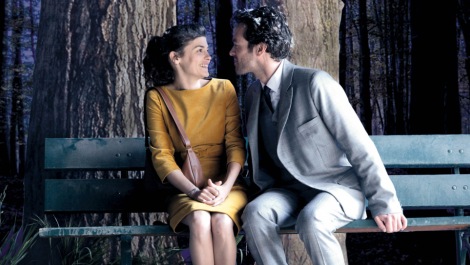Why you can trust GamesRadar+
Ten years ago, director Michel Gondry, with the not inconsiderable help of scripter Charlie Kaufman, crafted Eternal Sunshine Of The Spotless Mind , an era-defining love story. And watching Mood Indigo , you can’t help but think of that earlier triumph. Adapting from the cult 1947 novel L’Écume Des Jours by Boris Vian, Gondry is once again attempting to explore the mysteries of the human heart, only this time with less success.
Set in Paris, it focuses on Colin (Romain Duris), a wealthy inventor who lives in a splendid apartment with his chef-cum-lawyer Nicolas ( The Intouchables / X-Men star Omar Sy). All is well, until his best friend Chick (Gad Elmaleh) falls in love and Colin declares that he too must find romance. No sooner said than he meets Chloé (Audrey Tautou) at a party, dancing the ‘biglemoi’ – a bizarre jive where both partners see their limbs stretch like rubber.
With Chloé compared to a tune by Duke Ellington (whose 1930 jazz hit gives the film its title), so begins an increasingly bizarre madcap love story, one in which Gondry seems to pride visual lunacy over emotional content. Some of it is genuinely charming – like the tour across Paris in cloud-shaped pods. But more often than not it’s like being dunked head-first in a vat of whimsy, whether it’s watching a doorbell that turns into a scuttling beetle, a dining room table on skates or a hall of rotating typewriters.
While Gondry’s brilliance with homespun visual effects – blending CGI, stop-motion and in-camera practical work – has never been more to the fore, the result often overwhelms. Imagine the sheer level of invention Gondry displays in, say, his Björk video for ‘Army Of Me’, but for 94 minutes. What it does, unfortunately, is create a negative impact on the emotions swirling around the film’s second half.
As Colin soon discovers, Chloé is suffering from a life-threatening ailment – a water-lily growing on her lung – needing to be surrounded by flowers to keep her own petals from falling. Here, as the tone turns towards tragic and the colour palette washes-out, it should be heartbreaking, but the only thing liable to snap is your patience.
Tautou and Duris make for a pleasing pair – mind you, they’ve had plenty of practice, having coupled up in Cédric Klapisch’s 2002 film Pot Luck and its sequels Russian Dolls and Chinese Puzzle . Yet there’s nothing stand-out about their work here – coming a distant second to Gondry’s over-active imagination.
Like eating a box of chocolates in one sitting, Mood Indigo will leave you stuffed but hankering for something more substantial. Gondry-ites will be seduced, but this is as undisciplined as it is inventive.
James Mottram is a freelance film journalist, author of books that dive deep into films like Die Hard and Tenet, and a regular guest on the Total Film podcast. You'll find his writings on GamesRadar+ and Total Film, and in newspapers and magazines from across the world like The Times, The Independent, The i, Metro, The National, Marie Claire, and MindFood.



